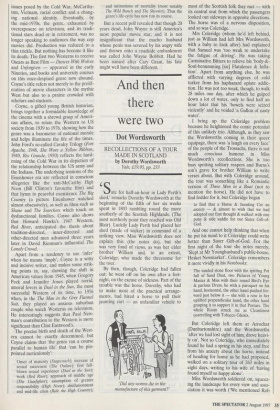And then there were two
Dot Wordsworth
RECOLLECTIONS OF A TOUR MADE IN SCOTLAND by Dorothy Wordsworth Yale, £19.95, pp. 233 Sate for half-an-hour in Lady Perth's shed,' remarks Dorothy Wordsworth at the beginning of the fifth of her six weeks spent in 1803 rambling round the more southerly of the Scottish Highlands. (The most northerly point they reached was Old Blair). Luckily Lady Perth had placed her shed (made of wicker) in command of a striking view. Miss Wordsworth does not explain this (the notes do), but she was very fond of views, as was her elder brother William and, to an extent, Coleridge, who made the threesome for the tour.
By then, though, Coleridge had fallen out; he went off on his own after a fort- night, on the excuse of sickness. Part of the trouble was the horse. Dorothy, who had to make most of the practical arrange- ments, had hired a horse to pull their jaunting cart — an unfamiliar vehicle to !Did any worms die in the manufacture of this garment?' most of the Scottish folk they met — with its central seat from which the passengers looked out sideways in opposite directions. The horse was of a nervous disposition, and so was Coleridge.
Mrs Coleridge (whom he'd left behind, just as William had left Mrs Wordsworth, with a baby to look after) had explained that Samuel was 'too weak to undertake the fatigue of driving'. He was taking Carminative Bitters to relieve his tody-&- Soul-benumming [sic] Flatulence & Infla- tion'. Apart from anything else, he was afflicted with varying degrees of cold turkey from his haphazard opiate addic- tion. He was not too weak, though, to walk 28 miles one day, after which he gulped down a lot of water, only to find half an hour later that his 'bowels were seized violently' and he voided 'a Gallon of nasty water'.
I bring up the Coleridge problem because he heightened the comic potential of this unlikely trio. Although, as they saw the Wordsworths coming in their queer equipage, there was 'a laugh on every face' of the people of the Trossachs, there is not much conscious humour in Miss Wordsworth's recollections. She is too busy spotting solitary reapers and Burns's son's grave for brother William to write verses about. But with Coleridge around, the tour was something like a Romantic version of Three Men in a Boat (not to mention the horse). He did not have to find fodder for it, but Coleridge began
to find that a Horse & Jaunting Car an anxiety — & almost to wish that we had adopted our first thought & walked: with one pony & side saddle for our Sister Gift-of- God.
And one cannot help thinking that when he put his mind to it Coleridge could write better than Sister Gift-of-God. For the first night of the tour she notes merely, `Slept at Mr Younghusband's public-house, Hesket Newmarket'. Coleridge remembers it more vividly in his Notebooks:
The sanded stone floor with the spitting Pot full of Sand Dust, two Pictures of Young Master & Miss with their round Bird's Eye & parlour Dress, he with a paroquet on his hand, horizontal, the other hand pushed for- ward just below it — she with a rose in her uplifted perpendicular hand, the other hand grasping it to support it in that Posture. The whole Room struck me as Cleanliness quarrelling with Tobacco Ghosts.
But Coleridge left them at Arrochar (Dunbartonshire) and the Wordsworths `after we had lost sight of him, drove heavi- ly on'. Not so Coleridge, who immediately found he had a spring in his step, and free from his anxiety about the horse, instead of heading for home as he had proposed, walked on a solitary tour of 263 miles in eight days, writing to his wife of 'having found myself so happy alone'.
Miss Wordsworth soldiered on, squeez- ing the landscape for every view and asso- ciation it was worth ('We mentioned Rob Roy and the eyes of all glistened'). It might have been jollier if she had kept notes, since she only wrote up the tour more than a year later. Composition was not easy: `William is calling to me every instant to hear some lines he is writing.' I sympathise with poor Dorothy (though she is not even a relation of mine by marriage); she and I and Jane Austen have had to make room on the kitchen table for our writing, with varying success. Dorothy eventually decid- ed to take refuge in the damp solitude of the Moss Hut in the garden. But then, half way through the literary childbirth, her beloved brother John was lost at sea, and, not surprisingly, the fun went out of her holiday hobby:
I am setting about a task which, however free and happy the state of my mind, I could not have performed well at this distance in time; but now, I do not know that I shall be able to go on with it at all.
But she did, and after her death it was published in decorative covers and bought and left on thick velvet cloths with tasselled fringes on parlour tables. Now Dr Walker has interspersed it with 210 black-and- white photographs of buildings and views en route; it took me some time to realise why they were different from most holiday snaps. It is because there are no people in them. 'I think journals of Tours, except as far as one is interested in the travellers, are very uninteresting', Dorothy Wordsworth wrote. Oh, I don't know.



























































 Previous page
Previous page